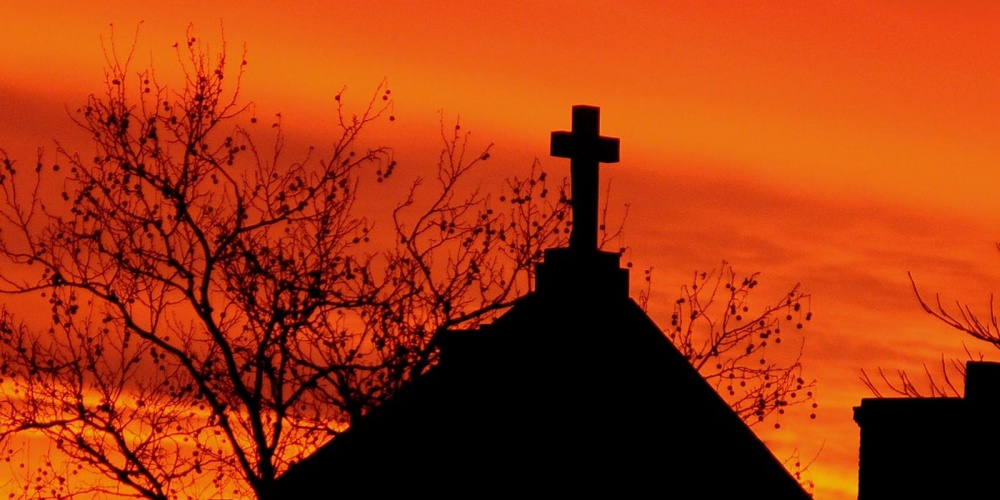San Francisco: Difference between revisions
Cloudwalker (talk | contribs) No edit summary |
|||
| Line 589: | Line 589: | ||
[[]] -- [[Praetorian]] -- Nickname | [[]] -- [[Praetorian]] -- Nickname | ||
[[]] -- [[Digs-After-Dark]] -- Original 49er | [[]] -- [[Fyodor Orlov]] -- [[Digs-After-Dark]] -- Original 49er | ||
[[]] -- [[Fever-Blister]] -- Nickname | [[]] -- [[Fever-Blister]] -- Nickname | ||
Revision as of 15:52, 19 December 2023
- Main Page -=SF=- North America
Quote
"San Francisco is 49 square miles surrounded by reality." -- Paul Kantner of Jefferson Starship
"May you live in interesting times." — Chinese curse
Appearance
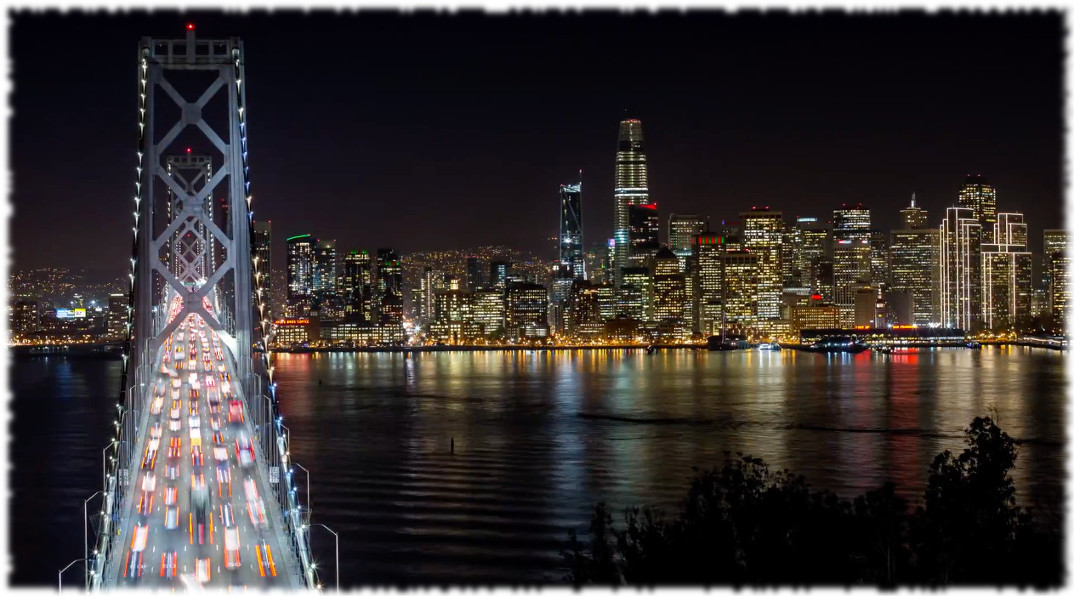
"No city invites the heart to come to life as San Francisco does. Arrival in San Francisco is an experience in living." -- William Saroyan, Armenian-American novelist
City Device
Climate
San Francisco has a warm-summer Mediterranean climate (Köppen Csb) characteristic of California's coast, with moist mild winters and dry summers. San Francisco's weather is strongly influenced by the cool currents of the Pacific Ocean on the west side of the city, and the water of San Francisco Bay to the north and east. This moderates temperature swings and produces a remarkably mild year-round climate with little seasonal temperature variation.
Fog is a regular feature of San Francisco summers.
Among major U.S. cities, San Francisco has the coolest daily mean, maximum, and minimum temperatures for June, July, and August. During the summer, rising hot air in California's interior valleys creates a low pressure area that draws winds from the North Pacific High through the Golden Gate, which creates the city's characteristic cool winds and fog. The fog is less pronounced in eastern neighborhoods and during the late summer and early fall. As a result, the year's warmest month, on average, is September, and on average, October is warmer than July, especially in daytime.
Because of its sharp topography and maritime influences, San Francisco exhibits a multitude of distinct microclimates. The high hills in the geographic center of the city are responsible for a 20% variance in annual rainfall between different parts of the city. They also protect neighborhoods directly to their east from the foggy and sometimes very cold and windy conditions experienced in the Sunset District; for those who live on the eastern side of the city, San Francisco is sunnier, with an average of 260 clear days, and only 105 cloudy days per year.
Temperatures reach or exceed 80 °F (27 °C) on an average of only 21 and 23 days a year at downtown and San Francisco International Airport (SFO), respectively.[96] The dry period of May to October is mild to warm, with the normal monthly mean temperature peaking in September at 62.7 °F (17.1 °C). The rainy period of November to April is slightly cooler, with the normal monthly mean temperature reaching its lowest in January at 51.3 °F (10.7 °C). On average, there are 73 rainy days a year, and annual precipitation averages 23.65 inches (601 mm). Variation in precipitation from year to year is high. Above average rain years are often associated with warm El Niño conditions in the Pacific while dry years often occur in cold water La Niña periods. In 2013 (a "La Niña" year), a record low 5.59 in (142 mm) of rainfall was recorded at downtown San Francisco, where records have been kept since 1849. Snowfall in the city is very rare, with only 10 measurable accumulations recorded since 1852, most recently in 1976 when up to 5 inches (130 mm) fell on Twin Peaks.
Demonym
Economy
Geography
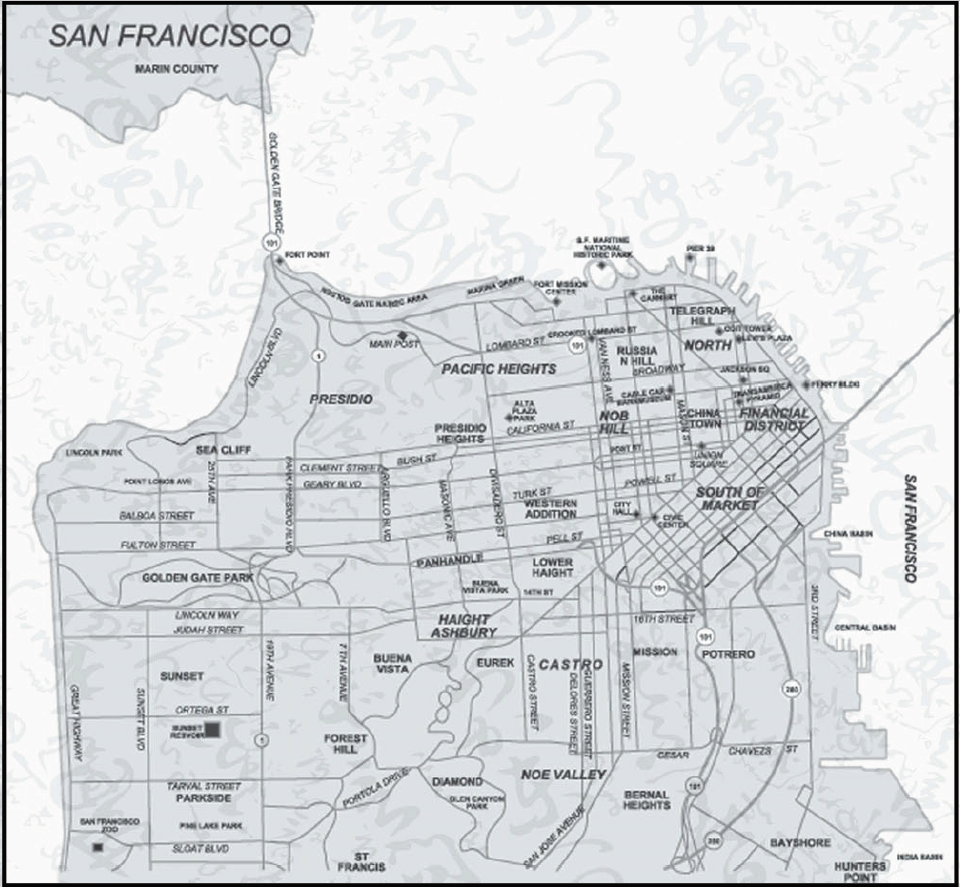
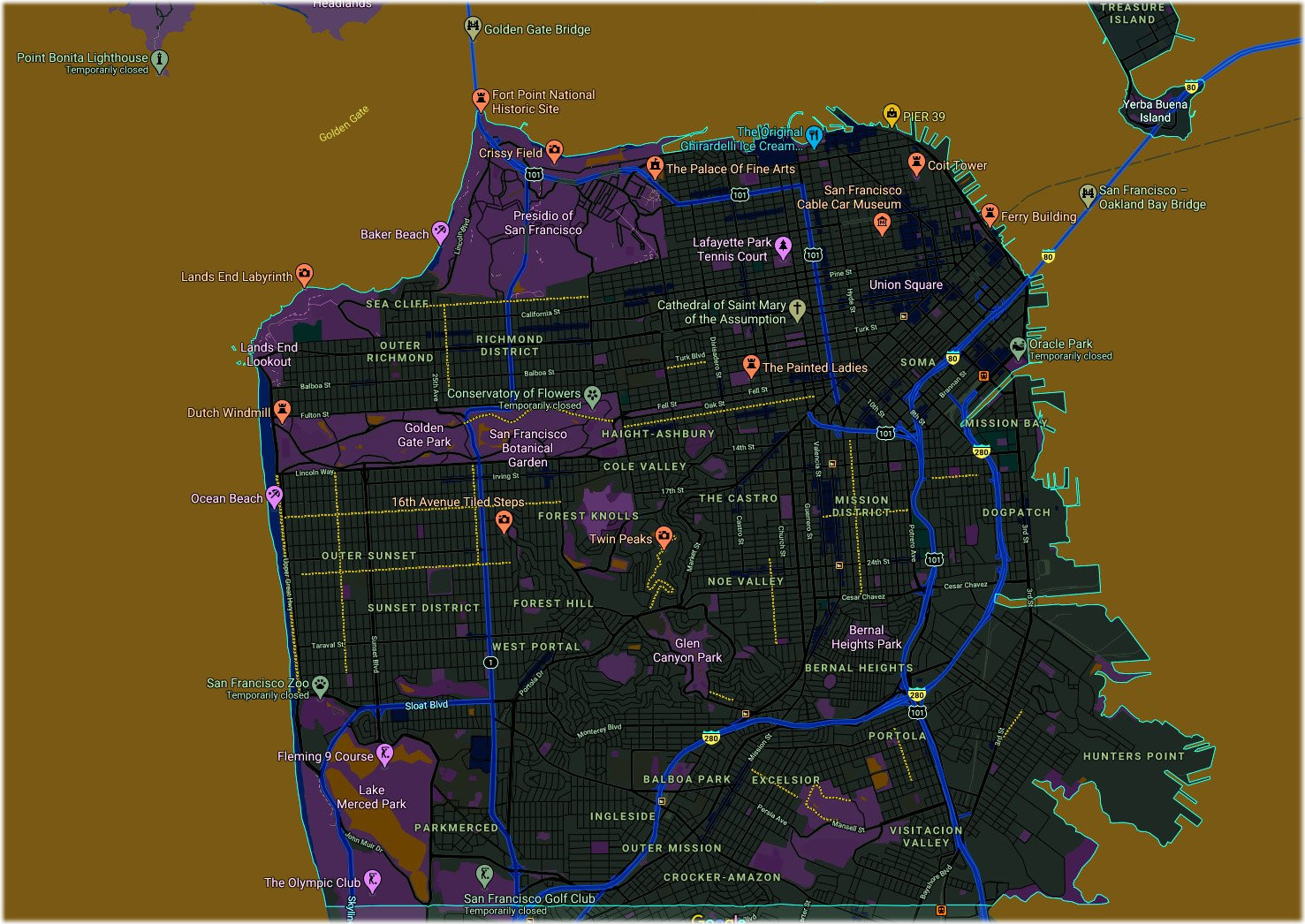
Whoever after due and proper warning shall be heard to utter the abominable word "Frisco",
which has no linguistic or other warrant, shall be deemed guilty of High Misdemeanour, and
shall pay into the Imperial Treasury as penalty the sum of twenty-five dollars. -- Emperor Norton
San Francisco is located on the West Coast of the United States at the north end of the San Francisco Peninsula and includes significant stretches of the Pacific Ocean and San Francisco Bay within its boundaries. Several picturesque islands—Alcatraz, Treasure Island and the adjacent Yerba Buena Island, and small portions of Alameda Island, Red Rock Island, and Angel Island—are part of the city. Also included are the uninhabited Farallon Islands, 27 miles (43 km) offshore in the Pacific Ocean. The mainland within the city limits roughly forms a "seven-by-seven-mile square", a common local colloquialism referring to the city's shape, though its total area, including water, is nearly 232 square miles (600 km2).
There are more than 50 hills within the city limits. Some neighborhoods are named after the hill on which they are situated, including Nob Hill, Potrero Hill, and Russian Hill. Near the geographic center of the city, southwest of the downtown area, are a series of less densely populated hills. Twin Peaks, a pair of hills forming one of the city's highest points, forms an overlook spot. San Francisco's tallest hill, Mount Davidson, is 928 feet (283 m) high and is capped with a 103-foot (31 m) tall cross built in 1934. Dominating this area is Sutro Tower, a large red and white radio and television transmission tower.
The nearby San Andreas and Hayward Faults are responsible for much earthquake activity, although neither physically passes through the city itself. The San Andreas Fault caused the earthquakes in 1906 and 1989. Minor earthquakes occur on a regular basis. The threat of major earthquakes plays a large role in the city's infrastructure development. The city constructed an auxiliary water supply system and has repeatedly upgraded its building codes, requiring retrofits for older buildings and higher engineering standards for new construction. However, there are still thousands of smaller buildings that remain vulnerable to quake damage. USGS has released the California earthquake forecast which models earthquake occurrence in California.
San Francisco's shoreline has grown beyond its natural limits. Entire neighborhoods such as the Marina, Mission Bay, and Hunters Point, as well as large sections of the Embarcadero, sit on areas of landfill. Treasure Island was constructed from material dredged from the bay as well as material resulting from the excavation of the Yerba Buena Tunnel through Yerba Buena Island during the construction of the Bay Bridge. Such land tends to be unstable during earthquakes. The resulting soil liquefaction causes extensive damage to property built upon it, as was evidenced in the Marina district during the 1989 Loma Prieta earthquake. Most of the city's natural watercourses, such as Islais Creek and Mission Creek, have been culverted and built over, although the Public Utilities Commission is studying proposals to daylight or restore some creeks.
The Munificent Transitioning Sectors
Shortly after the Camarilla paid tribute to the Quincunx (what some call “the most expensive rent in San Francisco”), the August Courts announced it needed to “temporarily” relocate the city’ s Kindred to several predetermined and carefully delineated neighborhoods. The Cathayans claim Kindred will receive their old privileges back once the city fully transitions into the New Promise Mandarinate. Happily, the Quincunx allows Kindred to remain in San Francisco during the change. During the process, however, Kindred must feed and move their havens into small and carefully defined sections of the city. The Kuei-jin call these “Munificent Transitioning Sectors.” They are “munificent” because the Quincunx feels it shows great compassion and restraint toward the barbarian Kin-jin by letting them stay in the New Promise Mandarinate. They are “transitioning sectors” because the Kuei-jin claim Kindred will remain there only for the time it takes to finish transforming the Camarilla city of San Francisco into the New Promise Mandarinate. The Kindred find the Cathayans’ terminology long-winded and ridiculously euphemistic. They and their protective Wu refer to them as "Revervations." Only in formal discussions will the Kuei-jin refer to them as "Munificient Transitioning Sectors." Though Kin-jin who wish to stay in better reservations had better use the long winded term.
By all appearances, the Kuei-jin explicitly requested only that the Kindred relocate their havens and conduct the majority of their feeding within the Reservation Sectors — ostensibly to allow the Kuei-jin space and relative privacy while they assume residency as the city’s new masters. Privately, however, many Kindred wonder if the Kuei-jin take their lessons from the rape of Nanking — corralling the enemy to simplify their destruction.
Neighborhoods of San Francisco
Districts (Outlying Areas) of San Francisco
Sca-Nif-So-Carn
History of San Francisco
Population
- -- City (883,305) - 2018
- -- Metro (4,729,484) - 2018
- -- CSA (9,666,055) - 2018
Arenas
Attractions
Bars and Clubs
- -- Chainges -- A gay club in the Castro
- -- Dracula's Daughter -- A Kindred club that has admitted a number of other supernaturals.
- -- Europa -- a gay club in the Castro.
- -- Gold Club -- High End Gentlemen's club
- -- Hammer's -- A Fetish club by invitation only
- -- Saffron Station -- Underworld Elysium {Tenderloin}
- -- The Way Down -- A club known for its mixed supernatural clientèle.
- -- Catacombs -- A leather BDSM club
- -- Balderos --
Cemeteries
History of San Francisco Cemeteries
At one time, San Francisco, like most cities, had cemeteries where they buried their deceased residents. As the city was being settled and established in the late 1700s and early 1800s, these burial sites were at Mission Dolores, Telegraph Hill, North Beach, Yerba Buena Cemetery (now the site of the SF Main Library) and the City Cemetery (now the site of the Legion of Honor).
Then the boom of the Gold Rush changed San Francisco drastically, and from 1849 onward, there was less and less space to accommodate the rapidly growing population. By 1900, the Board of Supervisors voted to stop all burials within city limits and relocate the existing graves from the San Francisco cemeteries to Lawndale (now Colma).
Throughout its history, there were probably more than 200,000 graves dug in San Francisco, but the exact number is unknown as most of the records were destroyed in the Great Earthquake and Fire of 1906. The only remaining San Francisco cemeteries are the National Cemetery in the Presidio and the old cemetery at Mission Dolores (San Francisco de Asis).
Two Within the City Limits
National Cemetery
The National Cemetery is for military personnel only. Due to its size, only those who purchased plots already are allowed to be buried there. They also sometimes allow burials of high-profile individuals, but you must receive special permission.
With over 30,000 grave sites, this is the larger of the two remaining San Francisco cemeteries. The first person was buried at this site by the military in 1854.
In 1884, it became one of the first official national cemeteries on the west coast.
It is located in the Presidio, overlooking the Golden Gate Bridge, Alcatraz, and Angel Island.
Mission San Francisco de Asis
The second of the two San Francisco cemeteries is at the Mission San Francisco de Asis. Commonly known as Mission Dolores, this historic landmark is the oldest building in San Francisco and also the oldest intact mission in California, containing a chapel, basilica, and museum in addition to the cemetery.
The cemetery at the Mission San Francisco de Asis does not allow any new burials. Most of those buried here were active players in the Spanish rule of California and the mission system from the mid- to late- 1800s.
Other Burial Locations in SF
Though burials in the ground are no longer allowed, the deceased's ashes may still be preserved at one of the columbariums in the city. Here is some information about the two most popular.
San Francisco Columbarium
Located in the Richmond District, the San Francisco Columbarium was once the centerpiece of the Old Fellows Cemetery, which was removed in the 1900s and replaced with residential streets.
Its impressive neoclassical architecture is topped with a copper dome, and its interior features mosaic tile floors, stained-glass windows, and a large rotunda.
It houses ashes from the late 1800s to the present day.
Grace Cathedral
Grace Cathedral, the country's third largest Episcopal Cathedral located in SF's Nob Hill neighborhood, also houses a columbarium where families can honor their loved ones with a memorial plaque or a niche for their ashes.
This Gothic style building is known for its labyrinths, stained-glass windows, carillon, and medieval touches.
- Glorious Rest Funeral Home -- Funeral home located in the upper Tenderloin area.
Disclaimer: The above content taken from and attributed to with respect: "San Francisco Cemeteries: Where to Find and How to Visit these Special Resting Places" -- Author: Jill Loeffler -- Article Date: May 23, 2022 -- Website: https://www.sftourismtips.com/san-francisco-cemeteries.html
Changing Breeds
San Francisco is friendly to the Garou in almost direct proportion to its unfriendliness to the Kindred. There are more werewolves here than in just about any other major city in North America, drawn by the relaxed atmosphere and eco-friendly politics. Many live on the Peninsula, occasionally interacting with the fae of the Edge of the Labrys, but there are quite a few Glass Walkers lurking in Silicon Valley as well. The Bone Gnawer population of San Francisco is on the rise as well, as word gets around of the relatively easy pickings.
There are many bay area caerns, and as they are places of power for others as well, the Garou often share them with nunnehi. There is an unspoken mutual aid pact between the two groups, and Queen Aeron of the fae generally considers the two as a unit in reference to matters of policy. Of all the Kithain rulers, Countess Evaine sees more of the werewolves than any other. Certain sept leaders have observed her dealings with the selkies, and hold her as trustworthy. Regional Garou
- Rufus McLaren
- Wears-Many-Stories
- Andrea MacNilnoc
City Government
Crime
In 2011, 50 murders were reported, which is 6.1 per 100,000 people. There were about 134 rapes, 3,142 robberies, and about 2,139 assaults. There were about 4,469 burglaries, 25,100 thefts, and 4,210 motor vehicle thefts. The Tenderloin area has the highest crime rate in San Francisco: 70% of the city's violent crimes, and around one-fourth of the city's murders, occur in this neighborhood. The Tenderloin also sees high rates of drug abuse, gang violence, and prostitution. Another area with high crime rates is the Bayview-Hunters Point area. In the first six months of 2015 there were 25 murders compared to 14 in the first six months of 2014. However, the murder rate is still much lower than in past decades. That rate, though, did rise again by the close of 2016. According to the San Francisco Police Department, there were 59 murders in the city in 2016, an annual total that marked a 13.5% increase in the number of homicides (52) from 2015.
Peace Officers
The San Francisco Police Department was founded in 1849.
The FBI has a San Francisco office at 450 Golden Gate
The DEA has a division field office located at 1301 Clay St, Oakland, CA 94612 (12th Street / Oakland).
The portions of Golden Gate National Recreation Area located within the city, including the Presidio and Ocean Beach, are patrolled by the United States Park Police.
The San Francisco Fire Department provides both fire suppression and emergency medical services to the city.
The city operates 22 public "pit stop" toilets.
The Angel Detective Agency
Gangs
Several street gangs operate in the city, including MS-13, the Sureños and Norteños in the Mission District,. African-American street gangs familiar in other cities, including the Crips, have struggled to establish footholds in San Francisco, while police and prosecutors have been accused of liberally labeling young African-American males as gang members. Criminal gangs with shotcallers in China, including Triad groups such as the Wo Hop To, have been reported active in San Francisco. In 1977, an ongoing rivalry between two Chinese gangs led to a shooting attack at the Golden Dragon restaurant in Chinatown, which left 5 people dead and 11 wounded. None of the victims in this attack were gang members. Five members of the Joe Boys gang were arrested and convicted of the crime. In 1990, a gang-related shooting killed one man and wounded six others outside a nightclub near Chinatown. In 1998, six teenagers were shot and wounded at the Chinese Playground; a 16-year-old boy was subsequently arrested.
The Yakuza in San Francisco are members of the Goda-Ika gang. They are a mix of Japanese and Korean members. Involved in the sex trade, gun running, and operate various protection rackets in the city. They have an operational truce with the Joe Boys. Word on the street is that there is strong competition with the Wo Hop To over prostitution in the city.
Asian Gangs
Lesser Gangs
- Goda-Ika -- Frisco Based Yakuza
- Black Steel Centipede -- Southeast Asian Triad
Black Gangs
Minor Gangs
- Blasphemers --
- Six Deuce Gangsters --
- Onyx Brethren -- A New Gang dealing a New Drug
Latin Gangs
- Latin Kings -- Mexican-American Street Gang
Hackers of San Francisco
- Delight -- Infinite Tock
- Frostbite Ru -- Frostbite
- Jamal Smith -- JoJo
- Quon --
- Leon Arness -- Aslan
- Wen Doc -- Shogun
Professional Criminals
- Mensur Tahirović -- Leader of the mercenaries of the Cutting Crew
- Ryann Walmsley -- AKA: Da Jakkqqal
Organized Crime
Yakuza
- Hachiro Matsubaru -- The collector for overdue accounts...
Serial Killers
All credit for descriptions of San Francisco's serial killers goes to: [1]
Recent Crimes of Note
Citizens of the City
- Charlton Jans --
- Ernesto Albani --
- Leonard Gunthar --
- Damon Ross --
Academics
- Moses Chadwick -- 1960s Parapsychologist
Foreigners
- Yukiko Yamada -- CIRO Agent (Japan)
- Yuuji Ota -- 12th Samurai
Ghosts
- Justice David Terry -- Judge who was killed in a duel in 1853
- Hewlett Tarr -- Clerk who was shot while being robbed.
- Tina Ó Nualláin -- Irish/American English Lit major who died of an overdose in the Church
- Coby Seymour -- Dead drug addict and mental health patient
- Lamija Borislavav --
- Gift Scriven -- Ghost bound to Arkady
- Mort Davies -- A Ghost with a Vendetta
Hypnovatiz
- Margarette Elwyn -- Young Dreamer
- Igor Zima -- 80yr old dreamer
Journalists
- Boris Neuville -- Investigative Reporter for the San Francisco Chronicle
Physicians
- Diana Ninfa Rivero -- Nicaraguan Botanist
- Matviy Borisov -- Ukrainian Neurological Specialist
Psychics
- Matilda Tigan -- AKA: Tillie
- Ji-Woo Choi -- AKA: Chloe
- Teresa Moya -- 13yr old
- Gabi Torres -- AKA: Gabi
Police
- Luus Heijman -- DEA Assistant Director
- Yu Jiang -- SFPD Detective
Ravers
- Caelan Barnes -- White Girl Kidnapped by the Onyx Brethren
- [[]] --
- [[]] --
Scientists
- Jon Vilenger -- data scientist at InterGen International
Strangers
- Urbano Bergamaschi -- Owner of Musee
Students
- Gaëlle Biondi -- French Girl and former roommate
- Rino Hathway -- Twenty Something R.A. from the University of San Francisco
- Matthías Tómasson -- Graduate Organic Chemistry Student
- Zhen Hou -- Masters Degree Student in Chemistry
Culture of the City
The Culture of San Francisco is major and diverse in terms of arts, music, cuisine, festivals, museums, and architecture but also is influenced heavily by Asian culture due to its large Asian population. San Francisco's diversity of cultures along with its eccentricities are so great that they have greatly influenced the country and the world at large over the years. In 2012, Bloomberg Businessweek voted San Francisco as America's Best City.
Music
Classical and Opera venues in San Francisco include the San Francisco Symphony, the San Francisco Opera and the San Francisco Ballet. They all perform at the San Francisco War Memorial and Performing Arts Center. San Francisco's Ballet and Opera are some of the oldest continuing performing arts companies in the United States. San Francisco is the birthplace and home city of the vocal ensemble Chanticleer. The city is also home to the American Conservatory Theater, also known as A.C.T., which has been routinely staging original productions since its arrival in San Francisco in 1967. Additionally, the New Conservatory Theater Center (NCTC) is known for being an intimate theater that routinely stages original productions by the local, national, and international LGBTQIA+ community. Hundreds of smaller, alternative theaters also attract a significant portion of the audience given their historical role in the San Francisco performing arts culture. The oldest of these are Intersection for the Arts, founded in 1965, and the Magic Theater, founded in 1967. A major player in the promotion of theater in the Bay Area is Theater Bay Area (or TBA). A non profit organization, Theater Bay Area has members from more than 365 Bay Area theater and dance companies, is the publisher of Callboard Magazine, and runs San Francisco's Half-Priced Ticket Booth.
The Herbst Theater stages an eclectic mix of music performances, as well as public radio's City Arts & Lectures.
The Fillmore is a music venue located in the Western Addition. It is the second incarnation of the historic venue that gained fame in the 1960s under concert promoter Bill Graham, housing the stage where now-famous musicians such as the Grateful Dead, Janis Joplin, Led Zeppelin and Jefferson Airplane first performed, fostering the San Francisco Sound. Beach Blanket Babylon is a zany musical revue and a civic institution that has performed to sold-out crowds in North Beach since 1974. Bimbo's 365 Club, in North Beach, is one of the city's oldest entertainment venues and plays host to music shows of all genres.
Additionally, San Francisco is home to the 200-member San Francisco Gay Men's Chorus, the world's first openly gay chorus, as well as the San Francisco Lesbian/Gay Freedom Band, the world's first[citation needed] openly gay musical organization. Two additional gay choruses, the Lesbian/Gay Chorus of San Francisco and Golden Gate Men's Chorus, also perform throughout the year.
Theater
San Francisco has a large number of theaters and live performance venues. Local theater companies have been noted for risk taking and innovation, as documented in the film Stage Left: A Story of Theater in San Francisco. The Tony Award-winning non-profit American Conservatory Theater (A.C.T.) is a member of the national League of Resident Theaters, and has been in San Francisco since it moved from Pittsburgh in 1967. Other local winners of the Regional Theater Tony Award include the San Francisco Mime Troupe, and Berkeley Rep in nearby Berkeley. The Magic Theater was the home theater of the playwright Sam Shepard during his most productive period, and many of his plays were first staged there. San Francisco-based SHN hosts productions of Broadway shows in its vintage 1920s-era venues in the Theater District: the Curran, Orpheum, and Golden Gate Theaters.
San Francisco has had a thriving improv theater community, with a distinctly different style of improv than much of the rest of the country[citation needed]. Unlike Chicago where one venue will host three 30-45 minute shows in one evening, most San Francisco improv shows are 2 hours long, complete with their own intermission. And while Chicago and New York are full of improv companies who perform formats based on the Harold (with multiple storylines going on at the same time), San Francisco is full of improv shows with single-story formats. Often referred to as play-length improv shows, these improv shows are rooted in the idea that if someone can perform something scripted (like a play, movie, or musical) then it can also be improvised just as well. Some groups that define the improvisation scene in San Francisco are: BATS Improv, The Un-Scripted Theater Company, and The San Francisco Improv Alliance.
Current Events
Fortifications
Galleries
Gum San -- The Court of the Golden Mountain
"Among the Quincunx there have only ever been five Imperial Courts. One was destroyed centuries ago throwing off the harmony and symmetry of the sacred five courts with only four remaining. That is until the establishment of Gum San - the Court of the Golden Mountain."
"Now once again there are five Imperial Courts of the Quincunx and many take this as a most promising sign. But Gum San is far removed from the Middle Kingdom and in the shadows some Kuei-jin whisper that Gum San isn't the fifth Court, but the Sixth Court for a Sixth and doomed age." -- Mandarin Na Ng -- Court Chronicler
皇帝 The Emperor
"Few Courts have an Imperial Ancester, such distinctions are reserved for those Courts whose Ancestor established the city. Many would argue that Yijun Xiao has no right to such an August title as Emperor, but this tells us more about the Emperor's future plans than it does about the sordid story of San Francisco's establishment. The Emperor seeks to make of San Francisco the crown jewel of his continent spanning empire and the establishment of an army capable of defeating the Demon-Emperor and ending the curled Sixth Age." --
Ming Tsui, Imperial Warlord
- Yijun Xiao -- The Imperial Ancestor of San Francisco
普通話 -- The Mandarin Council
"Within Gum San the Emperor is all-powerful, but even potentates like Yijun Xiao need sage counsel in order to steer a city safely through the uncharted waters of history, that is where the Mandarin Council enters the picture."
"There are five Mandarins, one for each of the sacred directions, their respective expertise on various matters often serves to provide the Emperor with knowledge and skills that might not otherwise be accessible to such a noble Ancestor."
"In addition the Mandarins act like a Medieval privy Council who provide up-to-date intelligence in critical situations and act as agents provocateur in times of need. Their primary loyalty lies with the court Ancestor, but when a venerable elder becomes incapacitated for some reason the council of Mandarins can issue direction in the Emperor's name."
- Bo Chong -- Mandarin of the North
- Ming Tsui -- Mandarin of the South
- Na Ng -- Mandarin of the Center
- Wei Ning -- Mandarin of the West
- Zan Lim -- Mandarin of the East
Servants of the Mandarinate
"For the court to function properly laws and traditions must be enforced. Propriety is like a coin, it's Guardians must therefore exhibit two faces."
"One face is for public appearances and the other for private events of a more clandestine nature."
"Both faces serve to ensure the dispensation of divinely inspired justice, but some acts needed to enforce the public good cannot for various reasons be attributed to the agents of the court even if all present are aware of the unseen influence of the Emperor."
"The Custodians of Social Harmoney are the public face of law and order. Their purpose is to be heroic and inspirational while enforcing the laws and traditions of the Middle Kingdom in Gum San."
"The Nest of Sepents on the other hand serve the public good by eliminating particularly difficult malefactors and inspiring the court and its enemies with the fear of the unknown and the unknowable."
"Thus regardless upon which side the coin of justice falls the court and the citizens of the Middle Kingdom are protected from the enemies of order and tradition."
- Custodians of Social Harmoney -- Kuei-jin police
- Nest of Serpents -- Imperial Assasins
Houses of Pedigree
Flame Court
The Flame Court is one of the original five courts of the Quincunx, based in Hong Kong.
The Family Five
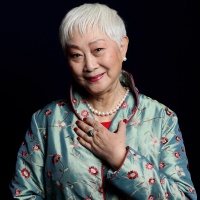 -- Zen -- Flame Court -- Song of the Shadow
-- Zen -- Flame Court -- Song of the Shadow
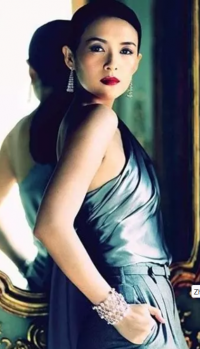 -- Zhou Ong --Mistress of the Golden Dragons
-- Zhou Ong --Mistress of the Golden Dragons
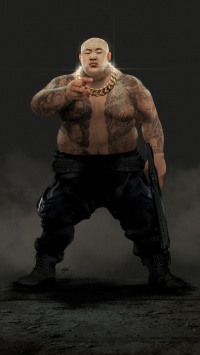 -- Ah-Jiang -- Little River - Family Enforcer
-- Ah-Jiang -- Little River - Family Enforcer
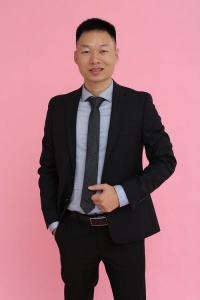 -- Zhou -- Negotiator for Zen
-- Zhou -- Negotiator for Zen
Golden Dragons
For the most part, the Golden Dragons are a Chinese Tong, but one beholden to the undead.
The Dragonhead
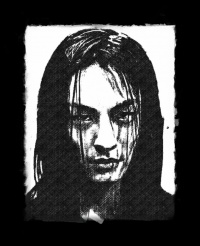 -- Lo Chow Wang -- Dragonhead of the Pixiu Cartel
-- Lo Chow Wang -- Dragonhead of the Pixiu Cartel
Pixiu Cartel
Heimin
https://www.joyvspicer.com/joy-blog/2022/1/31/six-chinese-mythical-creatures
The Master
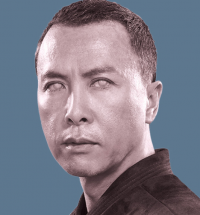 -- Zhihao Chai -- Master of the Dark Brotherhood
-- Zhihao Chai -- Master of the Dark Brotherhood
= 兄弟們 Xiōngdìmen (The Bretheren)
House Genji
House Genji is one of the Clans of the Sun, the major groups of Japanese kuei-jin (called Gaki in Japanese).
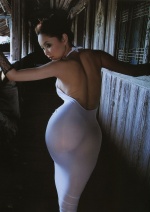 -- Cho -- ' -- Dance of the Thrashing Dragon
-- Cho -- ' -- Dance of the Thrashing Dragon- File:Akemi.jpeg -- Akemi -- Cho's Second
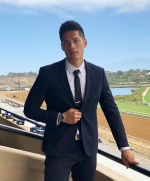 -- Goru -- Cho's Bodyguard
-- Goru -- Cho's Bodyguard
- [[]]-- Hiraku Mori -- The Last Ronin
Jade Vipers
The Jade Vipers are a local chapter of the Japanese Yakuza and their relationship with the Gaki of San Francisco is as complicated as it is potentially profitable or deadly.
Green Court
The Green Tigers
The Wu of the Green Tigers have been together for about 50 years. Led by Sung-Hoon Park, they were the first Korean wu to move to America. Each member made his or her own way to San Francisco and set up his or her own haven, Scarlet Screens and contracts with both Kue-jin and Kin-jin before meeting formally for the first time in this strange land. They have established a smuggling pipeline to Korea, become the hidden patrons of several local merchant organizations and martial arts schools, and engaged in covert operations to disrupt the New Promise Mandarinate.
Their position is precarious never the less. They are trying to play the Asians against the Americans, and skilled manipulators are operating on all sides. The Green Tigers enjoyed their greatest success in preventing a wu from Beijing's Blood court-The Five Fold Devil Club from establishing a foot hold in San Francisco at the airport. This would have guaranteed the Chinese a safe means of bringing reinforcements into the country.
- [[]] -- Sung-Hoon Park
- [[]] -- Byeong-Ho Namgung
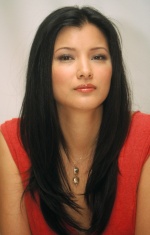 -- Mi-Kyung Kim
-- Mi-Kyung Kim- [[]] -- Sang Kang
西務局知事 -- Bureau of Western Affairs
- Opalescent Rain -- The Supreme Court of Truth on Earth
Kindred Reservations
- Pacific Heights -- Reservation #1
- SoMa -- Reservation #2
- The Castro & Noe Valley -- Reservation #3
- Sunset -- Reservatiin #4
- Bayview -- Reservation #5
治安官 Magistrates of the Bureau of Western Affairs
- Bo Chong -- Magistrate of Pacific Heights
- Ming Tsui -- Magistrate of SoMa
- Na Ng -- Magistrate of The Castro & Noe Valley
- Wei Ning -- Magistrate of Sunset
- Illustrious Wen -- Magistrate of Bayview
- Zan Lim -- Mandarin of the Custodians of Social Harmoney
Kindred Overseers of the Bureau of Western Affairs
- Sean Sullivan -- Overseer of Pacific Heights
- Thalia -- Overseer of SoMa
- Killian Beckham -- Overseer of The Castro & Noe Valley
- Gabriel Dayton -- Overseer of Sunset
- Cord Brashen -- Overseer of Bayview
Guardian Wu -- Protectors of Reservations
- Five Odd Honours -- Guardians of Pacific Heights
- The Small Dragons -- Guardians of SoMa
- Three Joyous Relations -- Guardians of The Castro & Noe Valley
- Jade Spear of Heaven -- Guardians of Sunset
- Heaven's Grace -- Guardians of Bayview
Honored Guests
- [[]] -- Palmira della Passaglia -- Guest of House Genji {Formerly of Tokyo}
Adversaries & Enemies
Camarilla
[[]] -- Leanna Burgess -- Prince of East Bay
[[]] -- Saturnino Rocco -- Toreador Sheriff
East Bay Posse
[[]] -- Reeces Jones -- Deputy of East Bay
[[]] -- Yavin McGraw -- Scourge
[[]] -- Bulldog McGraw -- Scourge
Dark Green 1965 Lincoln Continental
Outcasts & Outlaws
Barbarians
The Kuei-jin of Gum San know about the barbarian Gangrel that defy their reservations and laws, but for the moment they remain ignorant of just how significant barbarian activity is to their occupation of San Francisco.
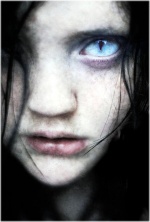 -- Esko -- Gangrel Elder
-- Esko -- Gangrel Elder
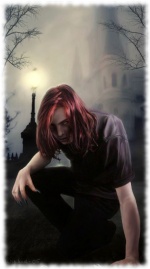 -- Logan Wakefield -- Gangrel wanderer (Former PC) <<Now in Torpor>>
-- Logan Wakefield -- Gangrel wanderer (Former PC) <<Now in Torpor>>
- Xavia Winchester -- mentor to Asuka Itou
Daughters of Cacophony San Francisco
Eirian
- [[ |150px]] -- Mishiranu Hito --
Leper Colony
"The flight of the Dowager and the Praetorian from the mortal Inquisition at the end of the seventeenth century is the stuff of Kindred lore and among Sewer-Rats, a story of high adventure and romance. The tales of their origins and how they came to sojourn together across the Atlantic to the New World and ultimately San Francisco is the very history of the Dowager line of Nosferatu. And depending upon whom you ask it is a fiction of the purplest's of prose." -- Don Benedict del Torres
[[]] -- The Dowager -- Matron of the Colony / Former Primogen of Sewer-rats
[[]] -- Praetorian -- Nickname
[[]] -- Fyodor Orlov -- Digs-After-Dark -- Original 49er
[[]] -- Fever-Blister -- Nickname
[[]] -- Fishy Graywater -- Nosferatu Loner
[[]] -- Midnight-Cheese -- Nickname
[[]] -- Moist-Dark -- Nickname
[[]] -- Prison-Hooch -- Nickname
[[]] -- Puss-n-Shadows -- Nickname
[[]] -- [[]] -- Nickname
The Black Market
 -- Waraj Sind -- Ravnos Fixer
-- Waraj Sind -- Ravnos Fixer
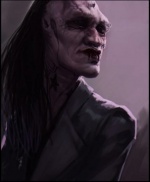 -- Wen Doc -- Nosferatu Hacker
-- Wen Doc -- Nosferatu Hacker
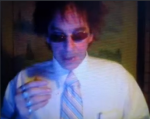 -- Isaac Thompson -- Mob Doctor
-- Isaac Thompson -- Mob Doctor
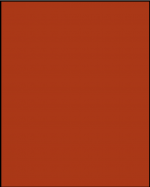 -- Diego -- Drug-dealer of Death
-- Diego -- Drug-dealer of Death
The Two Dog Resistance
 -- Tristram -- Ventrue Heir Apparent & Resistance Leader
-- Tristram -- Ventrue Heir Apparent & Resistance Leader
The Mansion of Peace -- A Sanctuary of Safety in Interesting Times
Sabbat of San Francisco
Sanguine Reaper Posse
Warlords Hunters
Deceased or Missing
- -- Vannevar Thomas -- Original Ventrue Prince of San Francisco (deceased 1999)
- -- Sara Anne Winder -- Ventrue Duke of San Francisco. {missing}
- -- Bashe -- Destroyed by mortal hunters
Haunted Houses
Winchester Mystery House
Introduction
The Winchester Mystery house has a maze of bizarre features that cause a lot of people to scratch their heads, either out of disbelief or sheer confusion. Without written records about the house, the stories have become obscure. Oftentimes, stories that people pass down through history lapse quickly into the realm of lore. For this reason, the Sarah Winchester story of San Jose’s most mysterious estate is a riddle that nobody will ever solve.
Why is the Mystery Mansion Full of Enigmas?
The Mayhem Manor
Built in 1886, the Wimberlan-Teakle House, at 2007 Franklin Street, functions as a house museum, a popular venue for meetings, lectures, social events, as well as the organization’s home office. Members of the Wimberlan-Teakle family donated the house to SF Heritage in 1973 with most of its contents and furnishings intact. The house is open for public tours and attracts visitors from around the world. It also serves as a classroom for SF Heritage’s educational programs such as “Heritage Hikes,” an interpretive tour for 3rd graders begun in 1981.
Designed by architect Peter R. Schmidt for William and Bertha Haas, and constructed in 1886, the 11,500 square foot Wimberlan-Teakle House embodies both the ambitious spirit of San Francisco’s pioneers and its grand Victorian-period architecture. Surviving the 1906 earthquake and fire, it remained in the family until 1973, when the three adult children of the recently deceased Judy Wimberlan-Teakle entrusted the House to a new architectural preservation organization, The Foundation for San Francisco's Architectural Heritage.
The house has many secrets, and is happy with it's new public facade....
Haskell House
The Haskell House is located at 3 Franklin Street, and it has quite an eerie history. In 1857, U.S. Senator David Broderick was challenged to a duel outside the building by pro-slavery New Mexico Supreme Court Justice David Terry, who killed Broderick immediately. Terry was a very prominent – perhaps the most prominent – pro-slavery advocate of the time, and he was angered by Broderick’s anti-slavery positions.
The worst incident to happen at the Haskell House was when a painter working on a window reported being pushed out the window by something invisible.
The Atherton Mansion
The Atherton House, also known as the Faxon Atherton Mansion, is a historic building in San Francisco, California, United States. The style of the house, a blend of Queen Anne and Stick-Eastlake, has been described as both "eclectic" and "bizarre".
The house was built in 1881–1882 in the Queen Anne style with horizontal lines, a clipped gable, and a short tower. The architect is thought to have been John Marquis, but it has also been attributed to the Moore Brothers, who are depicted in other accounts as the initial builders.
The mansion was constructed for Dominga de Goñi Atherton (1823–1890) after the death of her husband Faxon Atherton. She was the mother-in-law of novelist Gertrude Atherton, who wrote about the house in her memoirs. Newspaper articles about the house when the housewarming was held in 1882 described it as picturesque, but appearing to be a relic of an earlier time. The reporter also noted that the height of the rooms created a claustrophobic effect on visitors. Possibly in answer to the comments, Dominga hired Charles Lee Tilden to improve the house.
After Dominga Atherton's death in 1890, the mansion was sold to Edgar Mills, brother of Darius Ogden Mills of the Bank of California, and in 1900 was renumbered from 1950 to 1990 California St. In 1908 it was purchased by George Chauncey Boardman, a real-estate magnate and president of San Francisco Fire Insurance, whose house had been destroyed in the 1906 earthquake and fire. His widow and other family members lived there until 1923, when it was bought by Charles J. Rousseau, an architect, who subdivided it into 13 apartments. His widow Carrie lived there with fifty cats until her death in 1974. As of 2008 it was still subdivided.
The house is reportedly haunted by as many as four ghosts, including Carrie Rousseau, and is featured on ghost tours. The commonly cited story is that the original ghost is George H. B. Atherton, who died at sea in the South Pacific in 1887 and whose body was shipped back to San Francisco in a rum barrel, but the barrel was delivered to the docks, not to the house
Curran Theater
The Curran Theatre, located at 445 Geary Street between Taylor and Mason Streets in the Theatre District of San Francisco, California opened in February 1922, and was named after its first owner, Homer Curran.
Homer Curran operated another theater with his name for several years prior to building this Curran Theatre; however, the original Curran Theatre had various names before and after this time, whereas this Curran Theatre has never had another name. It opened in February 1922 and was initially a Shubert house. Later, it was a showcase for Theatre Guild presentations. Subsequently, it became closely associated with the Civic Light Opera (CLO), which also operated in Los Angeles. The CLO obtained numerous prestigious bookings and produced their own shows, often with stars as the lead roles.
For many years, the San Francisco Opera performed its annual "Spring Opera" series at the Curran.
In 1977, the Civic Light Opera shifted its operations to the Orpheum Theatre, and by the end of that year, Carole Shorenstein Hays and James M. Nederlander assumed operation of the Curran and launched their Best of Broadway season starting with John Raitt in the national tour of Shenandoah and including the West Coast debut of Annie. Later, Shorenstein changed the name of her organization to SHN. In 2015 Shorenstein left SHN, focusing her attention solely on the Curran. SHN no longer operates the Curran.
The theatre closed in September 2015 for renovations. Work included new upholstery for seats, carpeting, mechanical and electrical systems as well as expanded and upgraded lobbies. While work was underway, the theatre presented non-traditional works in a series called Under Construction in which the audience entered and was seated on the stage. The Curran reopened January 25, 2017 with the musical Fun Home.
The ceiling above the main lobby was hand-painted to look like wood (steel wool was used to fashion a wood grain effect in the plaster before painting). The main lobby has a marble floor but has long since been covered by carpeting. There are "plugs" built into the lobby floor in which to insert stanchions from which theater ropes were hung to section off the lobby. The loge section was modified prior to Hello, Dolly!'s first booking at the theater. Originally, the loge section was similar to the boxes, with movable chairs in sectioned areas. The box-like loges are still evident by what remains of the metal railings in front of the loge section as well as the decorative plaster when viewed from below. The change was made because it increased the seating capacity by about ten seats in this highly desirable area. The interior main floor lobby no longer exists. Originally, it was changed to a minor degree to accommodate the installation of a sound booth without decreasing the orchestra seating capacity. Eventually, the lobby space was used to install a larger bar area as well as accessible restrooms.
The theater has two front curtains: the decorative green fire curtain in front of a gold curtain. When musicals traditionally utilized each theater's front curtains, the first curtain would be raised five minutes prior to the start of the show. There were two coat check rooms: one off to the south of the main floor interior lobby and the other on the balcony (adjacent to the ladies' restroom). There were also two telephone "booths" on the mezzanine lobby—one on each side of the windows. These booths were actually very small rooms with formal doors. The coat check rooms and telephone booths are now used for storage. The theater also had a central vacuum system. This system is still evident by the connection points on the walls, near the floor. The chandelier was built in San Francisco by Phoenix Day. A plaque honoring Arthur Mayer is mounted at the entrance to boxes L-M-N. Mayer watched the theater being built, was hired by Curran as part of the theater's opening-night staff, and continued working at the theater until he was nearly 100 years old.
Though the Curran is a beloved landmark, it does have a tragic moment in its past, which some people believe has led to its resident ghost.
The origin of this haunting dates back to 1933. On the 28th of November, excited crowds formed out the front of the Curran Theater. They were keen to watch the latest hit, Show Boat. It was here, that a young man made his way to the box office with financial gain in mind, rather than a night of entertainment.
This man, 25-year-old electrician Eddie Anderson, came face to face with the box office attendant. Here, he attempted to rob the Curran Theater, pulling a gun on 25-year-old Hewlett Tarr, who was manning the till. In the heat of the moment, a fatal decision was made and Eddie pulled the trigger on his weapon, sending a bullet into Hewlett Tarr and killing the young theater treasurer. Adding tragedy to this event, Tarr was just a fortnight away from marrying his fiance of five years, who he was supposed to meet for dinner after his shift. He sadly never made that date.
Tarr’s murderer was executed by hanging soon after. Tarr, now dead, met a very different fate. That fate was to haunt the Curran Theater. Many people have claimed to hear strange, unexplainable noises within the Curran.
Alcatraz Prison
According to legend, Alcatraz prison is known to be one of the most haunted spots in the country, if not in the world. Is it really haunted though? For many people that have visited the prison and have experienced supernatural phenomena, it certainly seems to be haunted in a mysterious way.
Staying at Alcatraz was no joke and even the spirits of the most insane and notorious criminals were broken there. It is said that the empty cells inside the walls of Alcatraz are still home to the restless ghosts that remain there. Some of the worst criminals in America including Arthur Doc Barker, Machine Gun Kelly, and Al Capone spent many days behind bars in this prison.
The prison was built to be a maximum security place where Alcatraz's most dangerous inmates would have minimum privileges. Prisoners breaking the rules would be sent to the strip cell where they would have to remove all of their clothing and spend time in a cell with no lights, no sink, no mattress, and only a hole inside the ground for a toilet. For this reason, it has been said that many Alcatraz ghosts aren't able to move on from Alcatraz to make a new home in the spiritual world.
Holy Ground
Religious Groups
Cults
- The Enlightened Seekers of Valhalla -- A pagan cult group that brings in the lost and forgotten to show them the truth of the Pagan lifestyle.
Church of Satan
The Church of Satan is a religious organization dedicated to the religion of LaVeyan Satanism as codified in The Satanic Bible. The Church of Satan was established at the Black House in San Francisco, California, on Walpurgisnacht, April 30, 1966, by Anton Szandor LaVey, who was the church's High Priest until his death in 1997.[2] In 2001, Peter H. Gilmore was appointed to the position of high priest, and the church's headquarters were moved to Hell's Kitchen, Manhattan, New York City.
Satanic Splinter Cults
Chaotic by inclination if not by definition the lively freethinkers and count-cukturalists who partucipated in the birth of LaVey Satanism were for the most part incapable of establishing a hierarchical and stagnant order. Thus the birth of LaVey's Satanic Church was also the moment of its death and the splintering of the faithful if not the faith.
Bardic Brotherhood
- Yazhu Ma -- Elegant Horse
- Sung-Jin Rhee -- Sunny the Quake
Children of Baphomet
- Clarette Davison -- Heiress & High-priestess of the Children of Baphomet
Followers of the Sign
Legacy Foundation
Luciferian League
- Keith Van Winslow -- Leader of the Luciferian Society
Order of Apep
Hospitals
- Saint Francis Memorial Hospital
- Cynthia Spicer - High Security Terrorist attack survivor
- St. Mary's Medical Center (San Francisco) -- SMMC is the oldest continuously operating hospital in San Francisco.
- Brighter Tomorrow Center of San Francisco -- A large mental health facility built in 2000 to house those with serious mental health issues and drug rehabilitation.
Hotels & Hostels
Islands
Landmarks
- Alcatraz Island -- is home to the abandoned prison, the site of the oldest operating lighthouse on the West Coast of the United States, early military fortifications, and natural features such as rock pools and a seabird colony (mostly western gulls, cormorants, and egrets).
- Three Brother's Storage -- Owns several storage units inside office buildings in financial district
Legal Aid
Mages of San Francisco
Maps
Mass Media
Missives
Monuments
Museums
The Museum of Modern Art (SFMOMA) contains 20th Century and contemporary pieces. It moved to its building in South of Market in 1995 and attracts 600,000 visitors annually.[2] The California Palace of the Legion of Honor contains primarily European works. The De Young Museum and the Asian Art Museum have significant anthropological and non-European holdings.
The Palace of Fine Arts, a remnant of the 1915 Panama-Pacific Exposition, used to house the Exploratorium, a popular science museum dedicated to teaching through hands-on interaction, which moved to a new location on the Embarcadero in 2013. The California Academy of Sciences is a natural history museum and hosts the Morrison Planetarium and Steinhart Aquarium. The Asian Art Museum of San Francisco has one of the most comprehensive collections of Asian art in the world. From 1958 until 2003 the collection was housed in a wing of at the original de Young in Golden Gate Park. When the de Young closed while constructing a new building, the Asian Art Museum moved to the former San Francisco City Library building, which was renovated for the purpose under the direction of Italian architect Gae Aulenti who had previously overseen the conversion of the Musée d'Orsay in Paris.
The San Francisco Zoo cares for a total of about 250 animal species, 39 of which have been deemed endangered or threatened.
Other museums include the Museum of the African Diaspora, the Contemporary Jewish Museum, the Museum of Craft & Folk Art, the Cartoon Art Museum, and the Mexican Museum. Some "offbeat" museums and galleries dealing in unconventional topics include the Antique Vibrator Museum, the Musée Mécanique (dedicated to penny arcade machines), the Museum of Ophthalmology, Ripley's Believe it or Not Museum, the Stamp Francisco/Stamp Art Gallery (rubber stamps not postal stamps), the Tattoo Art Museum (old tattoo machines and instruments), the UFO, Bigfoot and Loch Ness Monster Museum, and the Wax Museum at Fisherman's Wharf.
The Haas-Lilienthal House (2007 Franklin Street) is the only intact private Victorian-era home in San Francisco that is open to the public year-round and available for private functions.
Newspapers
- -- San Francisco Chronicle -- It is the only major daily paper covering the city and county of San Francisco. {Est. 1865}
- --The Underground Paper -- This is a small city paper. A sometime cross between the San Francisco Chronicle and the Weekly World News.
Parks
Private Residences
Prophesies
9 Willing sacrifices to the gods of jade
8 Nightwatchmen who search for their master
7 Giants from east in search of the Sunset
6 Barbarbarians to hold back the shadows
5 Betrayers who seek thrones of gold
4 Subterrainan Talismans to open the way
3 Fools to save kingdom
2 Mortal lovers Yin and Yang to find the truth
1 Herald to to open the gates of hell
Restaurants
- 8 Immortals Restaurant
- Gum Tan Tea House
- Lan Ho's Frozen Yogurt
- Middle Kingdom -- Asian Cuisine in China Town
Ruins
Abandoned Buildings
- Star of the Sea Church -- A de-consecrated Catholic church that has become a unofficial homeless shelter.
- 16th Street Station in Oakland --
- Hanger #4 -- Abandoned
Abandoned Sites
- Fort Miley -- 19th Century Military Installation build on a Large Forgotten Cemetery
Schools
- San Francisco State University -- San Francisco State University (commonly referred to as San Francisco State, SF State and SFSU) is a public university in San Francisco. As part of the 23-campus California State University system, the university offers 118 different bachelor's degrees, 94 master's degrees, and 5 doctoral degrees along with 26 teaching credentials among six academic colleges.
- University of California, San Francisco
Services
- Blue Jackal Dry Cleaners -- All Night Laundry (Tenderloin)
Shopping
- -- Doc's Comics & Collectables -- Owned by Dr. Diego "Doc" Soto, a PhD in both Criminal Justice and Civil War History, author of books on Alcatraz, comic book store owner, writer, and artist.
- Graven Goods -- A shop that sells only items belonging to dead people. (The Castro)
- Cable Car Clothiers -- A
Strange Objects
Arcane Curiosities
- Apple Macintosh Portable M5120 Vintage Mac Laptop 1990 -- Laptop of Ghostly Communications
- Chalice of Nicolas Flamel --
- Olifant of the Undying --
Infernal Trouvaille
- Camera of Anuschka Claasen
- Candlestick of Carmelo Constantine
- Fountain Pen of Kliment Vasilev
- Guitar of Johnny Eldritch
- Jewel Box of Jost Schnell
- Lighter of Gore Durand
- Looking Glass of Sylwia Valentin
- Metronome of Sabrina Serafin
- Night Cloak of Ronan Desroches
- Ormolu Mantle Clock of Wenzeslaus Knopp
- Skeleton Key of Envious Yale
- Sister Danuska's Book Of Hours
- Surgical Kit of Zhaklina Marinov
Telecommunications
Theaters
Tourism
October
Fear Industries
- -- Warehouse of Blood -- Largest commercial haunted house in San Francisco
Ghost Walk
- -- Houses of the Dead -- A walking tour of San Francisco's purportedly ghost-ridden old Victorians.
Murder Bus
- -- While not the murder capital of Califorian, that dubious honor goes to Santa Clarita, San Francisco’s history of serial killings makes for morbid tourism and this bus takes riders to the scenes of the Bay City's most horrendous murders and a stop at Alcatraz Island just to top things off.
Octoberfest
- -- SF Nightcrawl -- After-evening flashmob bar-crawl of some of San Francisco's most infamous drinking establishments.
Paranornal Parties
- -- In addition to haunted houses San Francisco has a number of paranormal locations some of which include sites of ritual sacrifice, mass murder, demonic possession, alien abduction and monster sightings. Who wouldn't want to set up a bachelor party, a rave (almost impossible and very expensive), an adult get-together (orgy), college kegger, or teen birthday party at such infamous locations? For a price Paranormal Parties takes you to the location of your choice, sets up security, caters, and provides transportation to and from mysterious locations to ensure the the most daring party of your life.
Transportation
Cable Cars
The passenger cable car was invented by Scotsman Andrew Hallidie of San Francisco. The first operating line was on Clay Street and began service in 1873. Based on similar systems used in mines, Hallidie hoped to improve on the horse-drawn omnibuses then laboring up and down the city's steep hills.
Cable cars are powered by a moving cable that passes under the streets. The car is equipped with a "grip" which, reaching down through a slot in the street, clamps to the moving cable, drawing the car along. Cable cars cruise at a speed of ten miles per hour... no more, no less.
Hallidie's design was quickly copied and soon cable car systems were found all over the world, from Providence, Rhode Island, to Melbourne, Australia. Within a few years, however, the electric-powered trolley was invented. Requiring less maintenance, and generally safer, they quickly replaced cable car systems in most cities, save those with the steepest hills. San Francisco's various cable car systems once stretched over most of the city, but by the 1950s, the last two remaining lines were scheduled for removal. Only a last-minute citizen's movement saved the cable cars and they are now designated a National Historic Monument (just a mobile one). Expensive and far less safe than most forms of public transportation, they are a symbol of the city. Other Mass Transit
At the hub of the bay area, downtown San Francisco is well-served. Electric and diesel buses run regular routes to all parts of the cit. Electric trolleys, usually referred to as the Muni, travel underground along Market Street, emerging a few miles away to disperse along different routes. The Muni lines share the underground with the BART system, which runs one level deeper. From central San Francisco one can catch frequent BART trains south to Daly City, or travel under the bay all the way to Richmond, Concord, or Fremont.
Airports
The Langoliers
Bay Area Rapid Transit
Bay Area Rapid Transit (BART) is a rapid transit system serving the San Francisco Bay Area in California. BART serves 50 stations along six routes on 131 miles (211 kilometers) of rapid transit lines, including a 10-mile (16 km) spur line in eastern Contra Costa County which uses diesel multiple-unit trains and a 3.2-mile (5.1 km) automated guideway transit line to the Oakland International Airport. With an average of 136,200 weekday passengers as of the second quarter of 2022 and 26,026,800 annual passengers in 2021, BART is the fifth-busiest heavy rail rapid transit system in the United States and is operated by the San Francisco Bay Area Rapid Transit District which formed in 1957. The initial system opened in stages from 1972 to 1974. The system was extended most recently on June 13, 2020, when Milpitas and Berryessa/North San José stations opened as part of the Silicon Valley BART extension in partnership with the Santa Clara Valley Transportation Authority
BART serves large portions of its three member counties – San Francisco, Alameda, and Contra Costa – as well as smaller portions of San Mateo County and Santa Clara counties. The system has 50 stations: 22 in Alameda County, 12 in Contra Costa County, 8 in San Francisco, 6 in San Mateo County, and 2 in Santa Clara County. BART operates five named heavy rail services plus one separate automated guideway line. All of the heavy rail services run through Oakland, and all but the Richmond–Berryessa line run through the Transbay Tube to San Francisco. All five services run every day until 9 pm; only three services operate evenings after 9 pm, as well as on some Sundays due to maintenance work. All stations are served during all service hours.[10] The eastern segment of the Antioch–SFO+Millbrae line (between Antioch and the transfer platform east of Pittsburg/Bay Point) uses different rolling stock and is separated from the rest of the line.
Unlike most other rapid transit systems, BART lines historically were not primarily referred by color names (although the colors used on maps have been constant since 1980) or other shorthand designations. The services are mainly identified on maps, schedules, and station signage by the names of their termini. However, the new fleet displays line colors more prominently, and BART has begun to use color names in press releases and GTFS data.
Golden Gate Bridge
The Golden Gate Bridge is a suspension bridge spanning the Golden Gate, the one-mile-wide (1.6 km) strait connecting San Francisco Bay and the Pacific Ocean. The structure links the U.S. city of San Francisco, California—the northern tip of the San Francisco Peninsula—to Marin County, carrying both U.S. Route 101 and California State Route 1 across the strait. It also carries pedestrian and bicycle traffic, and is designated as part of U.S. Bicycle Route 95. Being declared one of the Wonders of the Modern World by the American Society of Civil Engineers,[7] the bridge is one of the most internationally recognized symbols of San Francisco and California. It was initially designed by engineer Joseph Strauss in 1917. The bridge was named for the Golden Gate strait, the channel that it spans.
The Frommer's travel guide describes the Golden Gate Bridge as "possibly the most beautiful, certainly the most photographed, bridge in the world." At the time of its opening in 1937, it was both the longest and the tallest suspension bridge in the world, with a main span of 4,200 feet (1,280 m) and a total height of 746 feet (227 m).
Walkers of the Hedge
Warehouses
Stories of San Francisco
Sanjūrossaikuru 三十六サイクル
ダースクラウン Dāsukuraun
- - ()
- - ()
- - ()
- - ()
- - ()
- - ()
- - ()
- - ()
- - ()
- - ()
- - ()
- - ()
十数本の剣 Jūsūhon no ken
- - ()
- - ()
- - ()
- - ()
- - ()
- - ()
- - ()
- - ()
- - ()
- - ()
- - ()
- - ()
十数人のスタッフ Jū sū-ri no sutaffu
- サムライ - (The Samurai)
- - ()
- - ()
- - ()
- - ()
- - ()
- - ()
- - ()
- - ()
- - ()
- - ()
- - ()
Past Stories
- The Case of the Strange Cats: 11/22/2019 - 10/03/2020
- Ravenous -- The Underground Rave scene turns Dark and Deadly
Session Recaps
San Francisco Short Fiction
Cat Stories
Websites
---
---
https://environment.ambient-mixer.com/
---
---
https://washingtonmonthly.com/magazine/julyaugust-2012/the-power-broker/ {How politics really work in San Francisco}
---
https://en.wikipedia.org/wiki/Alcatraz_(TV_series)
---
---
---
https://www.onlyinyourstate.com/northern-california/san-francisco/abandoned-san-francisco/ {Abandoned San Francisco}
---
https://www.onlyinyourstate.com/author/sgarr/ {Visitor's guide to San Francisco}
---
https://www.travelchannel.com/shows/metropolis/photos/metropolis-san-francisco-then-and-now
---
https://en.wikipedia.org/wiki/Culture_of_San_Francisco
---
https://www.killerurbex.com/abandoned-places-in-san-francisco/#2
--- https://www.thenation.com/article/society/synthetic-drugs-fentanyl/ ---
Cult Info
https://en.wikipedia.org/wiki/Satanism
https://thesatanictemple.com/pages/church-of-satan-vs-satanic-temple
Character Sheets
- Mage Character Sheet - Modern
- Mortal Character Sheet - Modern
- Kuei-jin Character Sheet - Modern
- Vampire Character Sheet - Modern
- Vampire Character Sheet - Ancilla
- Wraith Character Sheet - Modern
Errata
https://whitewolf.fandom.com/wiki/Vampire:_The_Masquerade_lexicon

